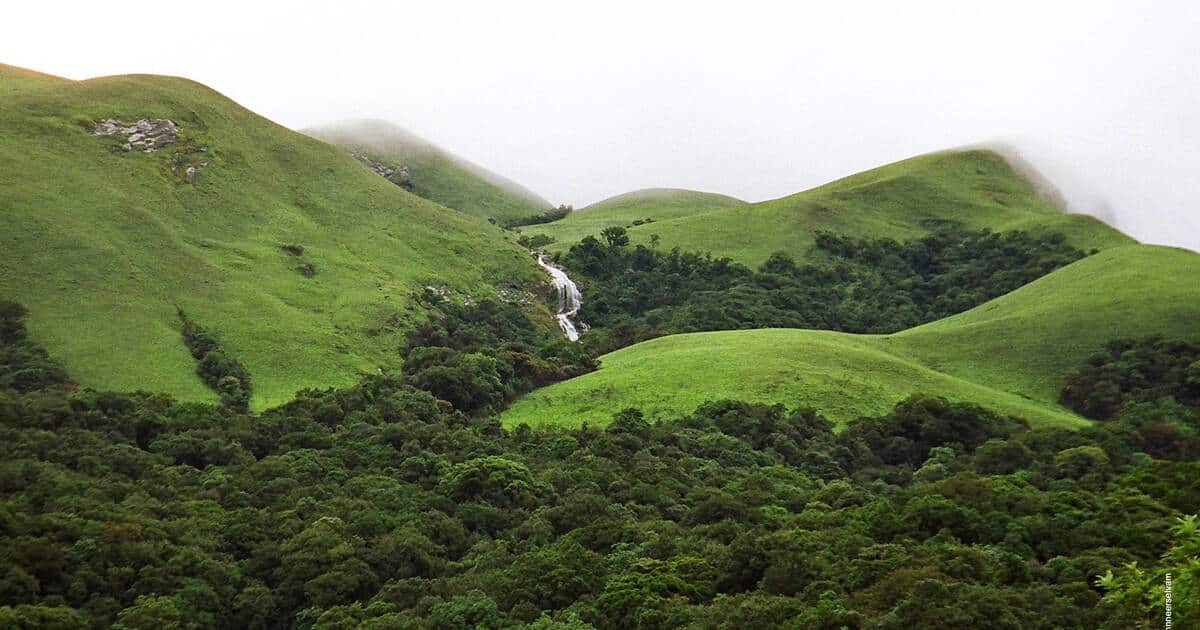What’s in today’s article?
- Why in News?
- About Western Ghats
- Recommendations of the WGEEP
- Resistance to the Implementation of the WGEEP’s Recommendations
- Recommendations of the Kasturirangan-led Panel
- Gadgil vs Kasturirangan Reports
- Status of Implementation of above Reports
Why in News?
- A landslide in Maharashtra’s Raigad district claimed 27 lives, flattened an entire village, and brought back into focus the conservation of the Western Ghats.
- During a discussion in the Maharashtra Assembly, state congress chief asked what had happened to the Madhav Gadgil Committee report on ecologically sensitive zones in the Western Ghats.
About Western Ghats:
- It is a mountain range that covers an area of 160,000 sq Km in a stretch of 1,600 Km parallel to the western coast of the Indian peninsula.
- It traverses through the states of Gujarat, Maharashtra, Goa, Karnataka, Kerala and Tamil Nadu.
- It is a UNESCO World Heritage Site and is one of the 36 biodiversity hotspots in the world.
- These Ghats are home to high mountain forests, which moderate the tropical climate of the region and present one of the best examples of the monsoon system on the planet.
- The forest in the Western Ghats has been severely fragmented due to human activities, especially clear-felling for tea, coffee, and teak plantations.
- In 2010, the Union Environment Ministry Jairam appointed the Western Ghats Ecology Expert Panel (WGEEP), to be chaired by ecologist Dr Madhav Gadgil.
- The Gadgil commission was formed to study the impact of population pressure, climate change and development activities on the Western Ghats.
- The commission submitted its report to the Centre in 2011.
Recommendations of the WGEEP:
- Designate the entire region as an Ecologically Sensitive Area (ESA) and classify 64% of the Western Ghats into Ecologically Sensitive Zones called ESZ 1, ESZ 2 and ESZ 3.
- Almost all developmental activities like mining, construction of thermal power plants, and dams were to stop along with the decommissioning of similar projects that have completed their shelf life in ESZ 1.
- In all the zones, genetically modified crops should not be allowed, use of plastic bags be prohibited, Special Economic Zones should not be permitted, new hill stations should not be allowed, etc.
- The report also suggested a bottom-to-top approach instead of a top-to-bottom approach in governance of the environment, indicating decentralisation and more powers to local authorities.
- It recommended the establishment of a Western Ghats Ecology Authority under the Environment (Protection) Act 1986, as a professional body to manage the ecology of the region and to ensure its sustainable development.
Resistance to the Implementation of the WGEEP’s Recommendations:
- Stakeholder states resisted the Gadgil panel recommendations amid fears of hindrance to development and loss of livelihood.
- In particular, Kerala had objected to –
- The proposed ban on sand mining and quarrying,
- Restrictions on transport infrastructure and wind energy projects,
- Embargos on hydroelectric projects and inter-basin transfer of river waters, and
- The complete ban on new polluting industries.
- In 2012, the Union Environment Ministry constituted a High-Level Working Group on Western Ghats under former ISRO chief Dr K Kasturirangan, to formulate a report to replace WGEEP.
Recommendations of the Kasturirangan-led Panel:
- It notified only 37% (against 64% by Gadgil commission) of the area as ecologically sensitive.
- It also split the Western Ghats into cultural (human settlements) and natural (non-human settlements) regions. It was suggested that cultural lands be designated as an ESA.
- It also consisted of red, orange and green categories.
- The red list entailed a ban on mining, stone quarrying, thermal plans and certain construction and township projects.
- The orange category had activities that would be regulated and taken up with appropriate permissions.
- The green category allows all agricultural and horticultural activities and commercial activities.
Gadgil vs Kasturirangan Reports
- The WGEEP was a pro-nature, pro-people report based on sound scientific information and feedback from central and state governments, zilla parishads, gram panchayats and people.
- Gadgil criticised the Kasturirangan report as faulty and unscientific because local communities have no role in economic decisions, clearly in violation of constitutional provisions.
Status of Implementation of above Reports:
- In 2014, the Ministry of Environment and Forests submitted that it is examining the recommendations of the K Kasturirangan-led panel and will not process the Gadgil report for further action.
- In 2017, the Environment Ministry demarcated an area of 56,285 sq Km in the Western Ghats as ESA as opposed to the 59,940 sq Km recommended by the Kasturirangan committee.
- In Kerala, this was brought down to 9,993.7 sq Km from the Kasturirangan committee recommendation of 13,108 sq Km as part of ESA.
- Gadgil claimed that implementing its recommendations would have lessened the severity of the floods and landslides in Kerala in 2018.
Q1) Why was the Environment (Protection) Act 1986 enacted?
The Environment (Protection) Act was enacted in 1986 with the objective of providing for the protection and improvement of the environment. The Act is widely considered to have been a response to the Bhopal gas leak.
Q2) Why are UNESCO World Heritage Sites?
World Heritage is the designation for places on Earth that are of outstanding universal value to humanity and as such, have been inscribed on the World Heritage List to be protected for future generations to appreciate and enjoy.
Source: Raigad landslide brings back focus on Madhav Gadgil report on Western Ghats: What it recommended
Last updated on June, 2025
→ UPSC Notification 2025 was released on 22nd January 2025.
→ UPSC Prelims Result 2025 is out now for the CSE held on 25 May 2025.
→ UPSC Prelims Question Paper 2025 and Unofficial Prelims Answer Key 2025 are available now.
→ UPSC Calendar 2026 is released on 15th May, 2025.
→ The UPSC Vacancy 2025 were released 1129, out of which 979 were for UPSC CSE and remaining 150 are for UPSC IFoS.
→ UPSC Mains 2025 will be conducted on 22nd August 2025.
→ UPSC Prelims 2026 will be conducted on 24th May, 2026 & UPSC Mains 2026 will be conducted on 21st August 2026.
→ The UPSC Selection Process is of 3 stages-Prelims, Mains and Interview.
→ UPSC Result 2024 is released with latest UPSC Marksheet 2024. Check Now!
→ UPSC Toppers List 2024 is released now. Shakti Dubey is UPSC AIR 1 2024 Topper.
→ Also check Best IAS Coaching in Delhi
























